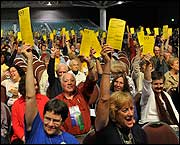General Assembly to allow some delegates to vote from home this year
Organizers seek volunteers to test online voting, with hopes of expanding program.
The GA Off-Site Trial, organized by a Unitarian Universalist Association staff committee, is seeking 200 people by April 15 to be part of the test. Those selected will be able to participate live in GA business sessions through their own computer connections. Offsite participants will have their votes registered, but not counted, this year. The plan is that this year’s test will provide enough information so that in the following year, at GA 2012, offsite delegates will be able to participate fully from home, including voting and having their votes counted.
The offsite trial was conceived as “a way of bringing us into the 21st century,” said Linda Laskowski, UUA trustee from the Pacific Central District and cochair of the offsite trial committee along with Mark Steinwinter, the UUA’s director of Information Technology Services. A mini-trial was done for GA 2010, with five congregations and 11 delegates.
Applicants have until April 15 to apply to be included in the 2011 test. Applicants will need to confirm they have been certified by their congregation as GA delegates and meet certain requirements involving computer and telephone access. Information about requirements, the application process, and selection criteria is at www.uua.org/offsitega.
Off-site delegates will be required to participate in training before GA, plus take part in a test of the system on June 1, and pay a $50 fee. They will not be required to pay any other GA registration fee. The 2011 GA is June 22 to 26 in Charlotte, N.C.
Off-site delegates will be subtracted from a congregation’s total authorized number of GA delegates, Laskowski said. For example, if a congregation is authorized seven delegates and two of them are off-site delegates and the other five attend in person, only the votes of the five who attend in person will be counted for official voting purposes. The others will be counted only for purposes of the test. However, the plan is that for GA 2012 all votes on or off-site will count.
Laskowski said that off-site delegates from a congregation or a cluster of congregations may gather at one site to watch GA sessions. Each will need a separate laptop or other computer to vote or participate in live discussions. The trial will include lay, ministerial, and religious educator delegates to reflect the whole potential delegate pool.
One of those who has applied to be an off-site delegate is Esther Hopkins, of Framingham, Mass. Hopkins is 84 and the widow of a minister. She said that she has been to about 20 General Assemblies, but no longer attends. “It’s hard for me to travel anymore,” she said. “But GA was always very important to me. I’d love to still be able to participate and hear what’s going on in the debates. Oh, I’d love to do that. Whether I’m chosen or not, this sounds like a very good idea.”
Diane Harney, of Tacoma, Wash., with the Tacoma UU Congregation, also applied. “I went to GA in St. Louis in 2006 and absolutely loved it. But I teach summer school and can’t generally go,” she said. “I’m excited we’re doing this. This will engage me in GA in a way that just watching it on a computer screen won’t do.”
Added Sheila Lauder, of the Quimper UU Fellowship in Port Townsend, Wash., “I’m chair of our Denominational Affairs Committee. I want to be able to encourage our members to make a commitment to become online delegates. So I want to be able to say I’ve done it. I want to invite some members of the fellowship to my house to see for themselves our UUA democracy in action. I think it will be an eye opener for anyone who has never been to GA.”
See sidebar for links to more resources. Comments powered by Disqus








